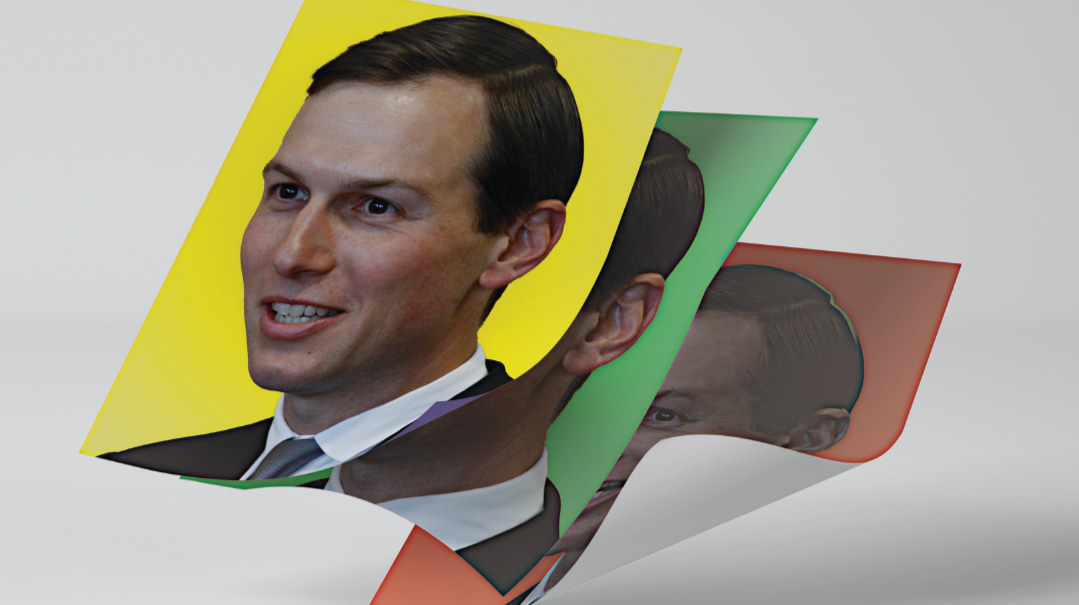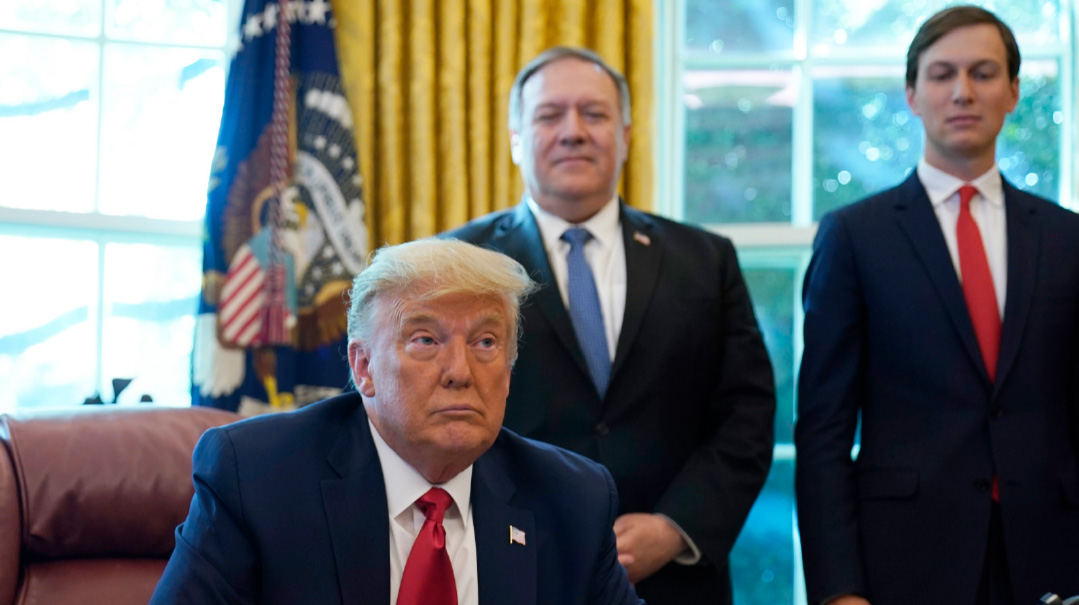The Kushner Files

Exclusive sneak preview!

Photos: AP Images, Flash 90
Exclusive Book Extract // Analysis
When Donald Trump handed his son-in-law the Middle East peace portfolio, the media laughed at Jared Kushner’s lack of experience. The joke was on them, as the 30-something Kushner pulled off a diplomatic coup with the Abraham Accords
IT was the Manhattan elevator ride that made Middle East history.
Donald Trump’s journey down to the marble lobby of his tower to launch his presidential bid in 2015 has long since become the stuff of political legend.
But overlooked in all of the storytelling about that day is that the future president wasn’t the only person there about to rocket into the history books.
Standing in a group photo of the Trump family that June 16 was his son-in-law. Almost exactly five years later, Jared Kushner would succeed in pulling off multiple peace deals between Israel and longstanding enemies across the Muslim world.
Along the way, Kushner — a graduate of the Modern Orthodox Frisch High School in Paramus, New Jersey — would become emblematic of a White House that was so heimish that the peace deal ceremony concluded with a Minchah on the Executive Mansion’s lawn.
If any of the reporters, supporters and gawkers in Trump Tower that day identified the then-34-year-old Kushner, it would probably have been to dismiss him as a privileged Jewish son of wealth who had married into a famous New York family.
That reaction would typify the national media’s scornful response once Trump handed his son-in-law and daughter Ivanka top roles in the White House.
Despite Kushner’s masterminding a sophisticated digital campaign strategy in the elections that brought in some top Silicon Valley talent, the accepted wisdom was that the Kushner appointment was plain nepotism. Media outlets looked askance at Jared’s place in Harvard, alleging that he was awarded a place only due to his father Charles’s large donation to the university.
By August 2017, though, it was becoming obvious that Trump’s son-in-law was succeeding in a crucial Machiavellian test — the intra-White House knife fights.
That month, Steve Bannon, Trump’s firebrand advisor who dismissed the couple as “Jarvanka” — globalists unfaithful to the president’s agenda — was fired.
Those watching his rare media appearances were impressed that under the sphinx-like demeanor was a commanding interview presence, a quiet combination of force and suaveness.
Kushner was also displaying another skill: listening.
“If you can’t produce peace in the Middle East, nobody can,” Trump said.
While that struck his detractors as Trumpian bombast — the bragging of a rich shver — Kushner proceeded to learn the subject for himself, touring the Middle East open to fresh approaches.
The story of Kushner’s astonishing rise to Middle East peacemaker is told in Breaking History, a heavily trailed new book by Jared Kushner, who provided Mishpacha with an advance chapter on the peace deals to preview.
Not the first book by Trump administration alumni, the author’s seniority has inevitably generated interest in the disclosures about the backstage of the most mercurial White House in modern times.
For those interested in the substance of the peace breakthrough more than the details of run-ins with presidential advisors Steve Bannon and John Kelly, Kushner’s account is a window into the reality of Trump’s biggest foreign policy success.
It’s a reminder of the visionary role that Bibi Netanyahu played in making the geopolitical ground shift.
Parsing the memoir with the help of multiple interviews with Israelis and Americans with knowledge of the accords also emphasizes something that the Israeli right never seemed to grasp: that the annexation of parts of the West Bank promised by the Trump peace plan would have set the stage for a Palestinian state.
With publication shortly after President Biden returned mostly empty-handed from a trip to Saudi Arabia, the account is also a reminder of the biggest counter-factual of Trump’s failure to secure a second term.
If the Abraham Accords team were still in the West Wing on the agreement’s second anniversary, would Israel now be toasting a peace deal in Riyadh?
When I first came to Washington, almost everyone accepted former secretary of state John Kerry’s assessment of peace with Israel: “There will be no advanced and separate peace with the Arab world without the Palestinian process and Palestinian peace.” I had questioned this assumption and instead embraced a new approach, based on my belief that countries would engage in new partnerships that offered more promise for their citizens than the status quo.
Paradigm Shift
If the Trump administration deserves credit for exploring a new path to Middle East peace, Bibi Netanyahu did a lot to beat out that path through the wilderness of failed peace plans.
As his term in office was coming to a triumphant close in December 2020 four months after the peace deal, Israel’s then-ambassador to America Ron Dermer told me that Bibi had been talking about disentangling peace with the Arab states from the Palestinian issue for many years.
“For as long as I’ve been privileged to know Netanyahu, which is 20 years, he’s believed that the paradigm could be reversed, and that a process of opening to the Arab states was possible even before a peace agreement with the Palestinians,” he said.
A public airing of those views came in 2016, when Bibi gave another of his prime-time performances at the United Nations.
“What I’m about to say is going to shock you,” the prime minister began. “Israel has a bright future at the UN — and the biggest change in attitudes toward Israel is taking place in the Arab world. For the first time in my lifetime, many states in the region recognize that Israel is not their enemy. Our common enemies are Iran and ISIS. I believe that in the years ahead, we will work together to achieve these goals, work together openly.”
Decades of Middle East peacemaking was based on the narrative that in order to establish diplomatic relations with the Arab states, Israel first had to solve the Palestinian issue. But Netanyahu thought the prerequisite was far different.
“The critical element for that peace was for Israel to be strong militarily and technologically, and that would create the diplomatic possibility for countries in the region to move toward Israel in order to serve their own interests,” Dermer continued. “That’s the deep background to what happened.”
Having long dreamed of a different approach to peacemaking, how did Bibi know when it was time to go public with his vision?
“Netanyahu’s speech to the UN was not, as we say, stam a statement — it was based on who he was meeting and what he was seeing,” explains Dermer. “And I can tell you that when I was in the prime minister’s office between 2009 and 2013, we would have many visitors who would come to Israel via Saudi Arabia or the Emirates, such as congressional delegations. They would listen to the prime minister and his analysis of the situation, where he would sketch out how he saw how things stood in the region. And they would respond, ‘You sound exactly like Mohammed ben Zayyid,’ or, ‘You sound like the Saudis.’ ”
Barak Ravid, an Israeli journalist who developed an early rapport with Jared Kushner on a 2016 visit to the White House, which led to a well-sourced book on the accords called Trump’s Peace, agrees about Netanyahu’s central role in building the base for the agreements.
“Working over a decade, and mostly behind the scenes, Netanyahu got the relationship with the Gulf States from zero to seventy, which enabled the peace deal to take it from seventy to a hundred,” he says.
“At his first meeting with Obama in 2009, Bibi told him that he wanted to broaden the circle of peace and get the Arab countries involved, and explained that that would make it easier to sell concessions on the Palestinian issue to the Israeli public. Obama agreed, but at that stage, the Arab states weren’t ready.”
Back in 2016, during the transition, Rick Gerson, an investor and fellow New Jersey native who had become a good friend over the decade I lived in New York City, had introduced me to several of his longtime close friends in Emirati leadership. Gerson’s introduction led to my first meeting with MBZ and his national security advisor, Tahnoun bin Zayed (TBZ), and commenced a constructive dialogue about how to end the endless wars, confront extremism, and pursue a future of greater prosperity and peace. Perhaps in a foreshadowing of what was to come, I was immediately struck by their respect for Israel and their acknowledgment of overlapping interests between the two nations.
Culture Counts
Israel signed peace treaties with Egypt in 1979 and Jordan in 1994, yet relations between Jerusalem and its two neighbors have remained chilly. Egypt elected a Muslim Brotherhood government in 2012, and Jordan’s lawmakers regularly denounce Israel in harsh terms.
The peace deals with the Gulf states highlight the difference between government-to-government agreements that don’t filter down, and those based on a broad cultural opening.
Signs of the shift in mindset across the Gulf became more obvious over the years as Jewish leaders and groups visited the area with ever greater frequency.
The process, Conference of European Rabbis president Rabbi Pinchas Goldschmidt told me in the wake of the peace deal, was a deliberate strategy to test the waters.
“The first step in establishing relations with Israel has historically been through the world Jewish community. Even nondemocratic countries need the consent of their populations, who’ve been fed decades of anti-Semitic propaganda, so this is their way of changing course.”
Eitan Naeh, now Israel’s ambassador to Bahrain, opened the first mission to the UAE last year in the wake of the agreement, and quickly learned that the quest for tolerance was genuine.
He discovered that his hosts were fond of a certain story about the Emirates and the Jews.
The hero of the tale was the UAE’s founding father Sheikh Zayed, a far-sighted statesman who turned a handful of cities at the tip of the Arabian Peninsula into a global trade and leisure hub.
A philanthropist who used to receive letters from all over the world asking for financial support, the sheikh, who died in 2004, was once visiting Switzerland, and an aide was reading through the day’s solicitations.
Suddenly, the man opened a letter and then pocketed it.
“What is it?” asked Sheikh Zayed, but the aide brushed the question aside and continued to read.
When the pile of letters was finished, the sheikh asked his advisor again what had been in the envelope that he’d skipped. Left with no choice, the aide told the Emirati ruler that it was a request for help from a Jewish man.
“So why did you put the letter away?” demanded Sheikh Zayed. “Is he not a person?” He instructed that the man’s request for $2,000 be answered with a check for double.
By the end of July, we had reached a tentative agreement with Israel and the UAE. We needed to draft a joint statement from the UAE, Israel, and the United States providing the high-level details of the agreement. Ten days of around-the-clock shuttle diplomacy produced more than a hundred versions of the document. On multiple occasions, negotiations almost came to a halt. Understanding the magnitude of the agreement, both sides treated every word as a life-or-death issue. By August 7 the normalization talks were on the verge of breaking down. Avi presented me with the latest draft that he thought was the best possible compromise. Yet problems remained. One of the outstanding issues was that Bibi would say only that he had agreed to “postpone” the annexation rather than “suspend” it, and the Emiratis found this, as well as several other issues, unacceptable.
Land or Peace
The euphoria of the peace agreements has a way of playing with historical memory, so it’s hard to remember that two years ago, international attention was focused on Israel’s proposed annexation of the West Bank, not on a breakthrough with the Gulf states.
The swift pivot from annexation to peace breakthrough raises questions about who knew what, and when?
When Netanyahu promised in May 2020 that he would apply Israeli law to parts of Yehudah and Shomron under the Trump peace plan released in January of that year, was he serious about making that happen?
Equally, were the Americans on board for the move? Or was it all an elaborate ploy to gain leverage for the real prize — an opening with the moderate Arab states?
What was clear at the time was that on the Israeli side, only Bibi himself was aware of what was going on. Two weeks before the proposed annexation date of July 1, I found myself in Gush Etzion — which would have been incorporated into Israel proper if the move had gone ahead — talking to local leaders.
“We are all pieces on a giant chess board,” admitted Oded Revivi, the mayor of Efrat and the Yesha Council’s foreign envoy. “You get moved around, and you don’t see the bigger picture.”
“When we flew to DC on 48 hours’ notice for the peace plan unveiling, there was an understanding that something big is happening. Bibi anticipated that we would be able to apply Israeli law within 48 hours, and that the Americans were giving a blank check for annexation.”
“That,” continues Revivi, “is what I understood until last week. Today I’m not certain if the US knows what it wants.”
What had changed in the meanwhile was an unprecedented op-ed published by UAE ambassador to Washington Yousef Al-Otaiba warning of consequences for warming Israel-Gulf ties if annexation proceeded, and a series of revelations about the direction of the Trump plan.
“Annexation really was an option as far as the president was concerned,” says a former senior administration official. “It was all a question of timing, and the understanding that without serious Israeli concessions, annexation on its own would be one-sided. Netanyahu wasn’t ready to make those concessions.”
Barak Ravid adds that from Bibi’s side as well, annexation was serious — not just an election ploy.
“This wasn’t spin — it was an operational plan. But the Emirati op-ed destroyed Bibi’s narrative that the Arab world no longer cared about the Palestinians. That put Bibi on a collision course with the White House as July 1 approached.”
Missing from Kushner’s account is that he resorted to arm-twisting to get the Israeli government to back off from annexation. According to Ravid, the Americans threatened that Israel would lose US backing at the International Criminal Court if they went ahead with unilateral annexation.
Those details paint a far-less rosy picture about American attitudes and Israel’s strategic situation than Israelis were aware of as events unfolded in real time. Annexation would have been a very expensive endeavor with very few returns.
But one thing is certain: the fevered talk of changing the status quo in the West Bank had the unintended side effect of creating leverage for the Abraham Accords breakthrough.
“It put the moderate Arab states who wanted normalization with Israel on notice that annexation was a real possibility,” says the former administration official. “That in turn led to their decision to take relations with Israel out into the open.”
TO avoid telephones, which could be monitored, we relied on personal visits. Avi began cycling between the UAE embassy, the White House, and the Israeli embassy to work out the open issues.
On August 8th, the United Kingdom’s ambassador to the United States, Karen Pierce, called to warn that if the United States recognized Israel’s annexation, the British government would recognize Palestine as a sovereign state. I had found Pierce to be a thoughtful and talented diplomat, and we were often up-front with her about our impending foreign policy actions. But in this instance, to keep her off our tracks, I made an argument for annexation and explained why it would make sense to proceed as we had planned. The call confirmed that not even our closest allies knew that a peace agreement was about to be announced.

Plugging the Leak
Likely because major media outlets turned every droplet of gossip into a national story, the Trump White House leaked “with the vigor of an active Icelandic volcano,” as Politico colorfully put it.
By two months in, “the Trump administration had already burst its banks with sensational, revealing, and damaging leaks. The Washington Post had reported the dodgy phone conversations between President Donald Trump’s pick for national security advisor, Michael Flynn, and Russian ambassador Sergey Kislyak. An executive memo about reestablishing CIA ‘black site’ prisons had appeared in the New York Times. Trump advisors candidly — though anonymously — gossiped with the Times about the president’s ‘impetuous,’ impulsive ways and his reliance on ‘alternative facts.’ ”
In stark contrast, Jared Kushner’s team ran a leakproof ship, ensuring that the Abraham Accords took the world by surprise.
Hence, the nugget of biographical gold about Avi Berkowitz, a close advisor to Kushner, pedaling around DC to avoid compromised telephone links.
The maneuver to blindside the British ambassador — pretending that annexation was on the table when in reality the Americans had already invested capital in blocking it — was another demonstration of the Kushner team’s adroitness at hiding their true priorities.
Contrary to the myth of a feckless administration, the most successful American diplomatic move in the Middle East for decades was conducted with total operational security.
The naming of the accords is another gem of Kushner’s account. If not for the zero-hour intervention of a Puerto Rico-born general, the wings-of-history peace deal between Israel and the UAE might have been called something soulless like Comprehensive Framework for Middle East Normalization.
All available energy had gone into the nail-biting negotiations, so hours before the 11 a.m. announcement, and despite the best efforts of the peace team, the agreement still had no name.
Salvation came from an unexpected quarter. At 8 a.m. on August 13, as Jared Kushner sat in his quarters right next to the Oval Office, General Miguel Correa walked in.
The two-star Special Forces officer whose position as former military attaché to the Emirates made him the point man for the UAE side of the negotiations was a Catholic. He had the perfect Biblical solution, with a nod to the ancestry of both parties.
“Let’s call it the Abraham Accords,” he said — and in that haphazard way, history was made.
Finally, the call began. Trump was on the line with MBZ and Bibi. “This is very, very historic,” said the president. “This is something that is incredible.” MBZ thanked the president for his leadership and emphasized the importance of the agreement for the advancement of peace in the region. Bibi graciously thanked MBZ for his courage and Trump for his leadership. He said it was a “turning point for peace” and the biggest advance in more than a quarter century. When the call ended, everyone in the Oval Office was silent as we paused to absorb the gravity of what we had just heard and witnessed. Mnuchin stood up and clapped, and one by one, everyone else rose to their feet and applauded. The president watched in amazement and enjoyed the applause. Then he too stood up and joined us all in clapping.
“Jared’s a genius,” said Trump. “People complain about nepotism —I’m the one who
got the steal here.”
Trust and Verify
Having spent years disparaging Trump’s foreign policy, mainstream media outlets were forced to reckon with an outstanding win for the president — the boldest American move in the region for a generation.
In the New York Times, Thomas Friedman wrote with uncharacteristic generosity, “A geopolitical earthquake just hit the Mideast. For once, I am going to agree with President Trump in his use of his favorite adjective: ‘huge.’ ”
Trump himself soaked up the rare praise from the op-ed pages, telling Kushner that “I’ve never gotten better press coverage in my life. This is the most positive coverage I’ve gotten on anything that I’ve done since I’ve been president.”
Trump’s triumph was also a personal vindication for his son-in-law. From the get-go, Kushner’s appointment had been mocked by left-wing outlets as both nepotistic and doomed to fail.
“Over the past several years,” wrote conservative commentator Rich Lowry, “a new certainty was added to death and taxes: Jared Kushner would fail in his role as the administration’s Middle East point man.”
Lowry pointed to a New York magazine piece mocking an interview in which Kushner said he’d read a couple of dozen books on the conflict: “Jared Kushner Claims He Can Solve Israeli-Palestinian Conflict Because He’s ‘Read 25 Books on It.’ ”
“Part of his success was precisely that close link to the president,” says Barak Ravid. “Both Israelis and the Arab states understood that Jared spoke for Trump. It meant that the president saw this peace deal as an absolute priority.”
Within a short time, the initial opening to the UAE had roped in Bahrain, Morocco, and Sudan into normalization agreements with Israel.
The big prize was Saudi Arabia, and the widespread assumption was that the Emiratis would not have taken the plunge without the Saudis’ blessing — hence, a Saudi breakthrough was a question of time.
The chaos of Trump’s final weeks in office, followed by a new administration that declared the Saudi crown prince a “pariah” for his role on the killing of Jamal Khashoggi, a journalist, ended the push for normalization with the Sunni world’s heavyweight.
President Biden’s recent trip to Saudi Arabia emphasized the fact that two years after the euphoric breakthrough, the ultimate prize remains distant, although an agreement to enable Israeli plans to fly over Saudi Arabia was inked.
“It’s difficult to have to stand by and watch others continue what you began,” says the former administration official. “But I’m sure that peace with the Saudis will happen.”
(Originally featured in Mishpacha, Issue 922)
Oops! We could not locate your form.







